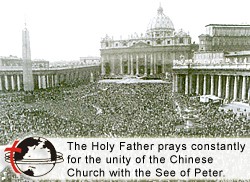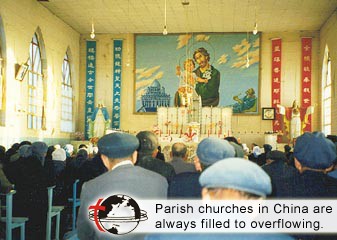
China Bridge (神州橋樑)_2004/Oct
A Blessing from the Heart

Since becoming pope in 1978, John Paul II has spoken directly to the Chinese people many times. He has always addressed them with utmost care, delicacy and understanding. Whenever he speaks to the Church in China, he speaks to the entire Church. He never refers to the official and unofficial Churches as two communities. He is aware, of course, of their division and prays daily for their reconciliation and total communion with the Holy See, but he is also mindful that they are one in faith, one in baptism and one in the Lord. Prayer, compassion and understanding are what the Holy Father relies on to bring about reconciliation and total communion with the See of Peter that he so desires.
The great Chinese people

In August 1979, from his summer home at Castel Gandolfo, John Paul II spoke directly to the Chinese people for the first time. The situation of the Church in China at the time was still very much only a matter of conjecture. Deng Xiaoping had shortly before launched his “Open Door Policy” that would open China to the outside world. Much of what had gone on in China in the previous 30 years was shrouded in mystery and especially mysterious was what had happened in and to the Church. His first remarks spoke of prayer. “Our prayer is directed to God constantly for the great Chinese people…”
Throughout his pontificate, John Paul II has tried to allay any fears the Chinese government might have concerning the allegiance Catholics have to the pope as their spiritual father. He has used every opportunity, especially during his visits to Asian countries, to remind the Chinese of his concern and his great love for them as a people and for their ancient culture.
In 1980 during an ad limina visit of the Taiwan bishops, he said, “The Chinese people, scattered throughout the continent, in Taiwan, Hong Kong and Macau and in the diaspora, is a great people, formed by a culture that is thousands of years old, formed by the thoughts of great and wise philosophers of ancient times and by family traditions, such as that relating to the cult of ancestors.”
Four years later in Korea he said, “On this occasion I am happy to renew the expression of my affection and esteem for the whole Chinese people to whom goes a sincere wish for prosperity, progress and peace.”
Authentically Chinese authentically Christian

Besides his prayerful concern for unity and reconciliation and his love for the Chinese and their culture, the Holy Father has another theme which he frequently repeats: There is no dichotomy in being authentically Chinese and authentically Christian. “The leaders of China can count on the full cooperation of Catholics in their efforts to develop the country. They lose nothing of their identity by living and sharing the message of Christ.” And again, “A Christian in any country of the world is faithful to God, but he also has a deep sense of duty and of love towards his native land and his own people. He respects the things of the spirit and at the same time he consecrates his talents and skills to the common good. A good Chinese Catholic works loyally for the progress of the nation, observes the obligations of filial piety towards parents, family and country… I am convinced that every Catholic within your frontiers will fully contribute to the building up of China.” He later emphasizes this point, “The civil authorities of the People’s Republic of China should rest assured: a disciple of Christ can live his faith in any political system provided there is respect for his right to act according to the dictates of his own conscience and his own faith. For this reason I repeat to the governing authorities, as I have said so often to others, that they should have no fear of God or of his Church… The Chinese nation has an important role to play in the international community. Catholics can make a notable contribution to this, and they will do so with enthusiasm and commitment.” (3 December 1996)
Love for the Holy Father
Even the casual observer who visits any Catholic community in China is struck with the deep love the bishops, priests, sisters and laity have for the Holy Father. They have a profound reverence for him and a love that is deep and genuine.
The Holy Father is deeply touched by this wellspring of affection. He says, “I receive information that attests to the perseverance of very many Catholics in the faith, in prayer and in religious practice and that shows their firm attachment to the See of Peter. This news has moved me deeply, and it impels me to offer up a prayer … that the Lord may pour out upon those brave brethren and upon the faithful people the gifts of fortitude and perseverance, maintaining in them the ardent flame of hope that does not disappoint.”
The Holy Father obviously receives many proofs of that love: “How many testimonies of faith, how many messages of fidelity I have received from communities throughout China! Bishops, priests, religious and lay people have wished to reaffirm their unshakeable and full communion with Peter and the rest of the Church. As pastor of the Universal Church, my heart greatly rejoices at this.” He wishes to remind them that he is mindful of the sufferings they have undergone which give proof of their fidelity and love: “We know very well that our brothers and sisters in China have had to face difficult and prolonged trials in the span of those thirty years. In those severe sufferings they have given proof of their fidelity to Christ and his Church… How consoling it is to receive news of the constant and courageous loyalty of Catholics in China to the faith of their fathers and to their filial attachment to Peter’s See…”
Inculturating the Gospel in China
The Gospel of Jesus is neither Western not Eastern. It is beyond any culture and belongs to all cultures. The Holy Father is well aware of the need for inculturating the Gospel in the local churches while being faithful to Christ. Inculturating the Gospel is a constant challenge for the Church and its missionaries because they “must find in the culture and traditions of the people to be evangelised an important and indeed essential point for framing the method of proclaiming the Gospel message, according to the needs of every moment.” In this regard, the Holy Father holds up Matteo Ricci as a master of evangelisation and a model missionary. “The aim of Father Ricci’s wonderful activity – as is well known – was to make the fascinating Chinese world known to the Western nations and the West to China, in view of a profitable cultural exchange which would favour a flow of mutual understanding.”
As with all his other deep desires, he entrusts the “evangelisation of China to the maternal protection of Mary, Queen of China.”
Humbly admitting the mistakes of the past
On 24 October 2001, the occasion of the fourth centenary of Matteo Ricci’s arrival in Beijing, the Holy Father took the unprecedented step of making a public apology for the mistakes made by missionaries in the course of their evangelising work in China: “History, however, reminds us of the unfortunate fact that the work of members of the Church in China was not always without error, the bitter fruit of their personal limitations and of the limits of their action… I feel deep sadness for these errors and limits of the past, and I regret that in many people these failings may have given the impression of a lack of respect and esteem for the Chinese people on the part of the Catholic Church, making them feel that the Church was motivated by feelings of hostility towards China. For all of this I ask the forgiveness and understanding of those who may have felt hurt in some way by such actions on the part of Christians.” It is not often that the Church speaks so candidly and humbly about the errors in judgment and action of its members.
A wish unfulfilled

John Paul II has longed to set foot on Chinese soil before he dies, to kiss the ground that has received the blood of so many martyrs and to greet the members of his flock personally. “But I have also come with the desire of being able in the future to travel to other Asian countries, in order to convey personally to them too my sentiments of deep respect and esteem.” (Manila 1981)
In an impassioned plea which reveals the depths of his concern and love, he prays, “O hearts of our brothers and sisters in the far-off land of China! Be united with us in this sacrifice or Redemption, as we are united with you.”
He is well aware that he will not set foot in China during his lifetime, but, nonetheless, puts all his desires for “the great people of China” into the heart of the Church. “Dear brothers and sisters in China, all of us are united with you in thought, affection and especially in prayer. Through the prayer of the whole Church, you – though distant – never cease to remain in the very heart of our great Catholic family which Christ is continually present, as he promised. In his name I bless you from my heart.”


 ENG
ENG